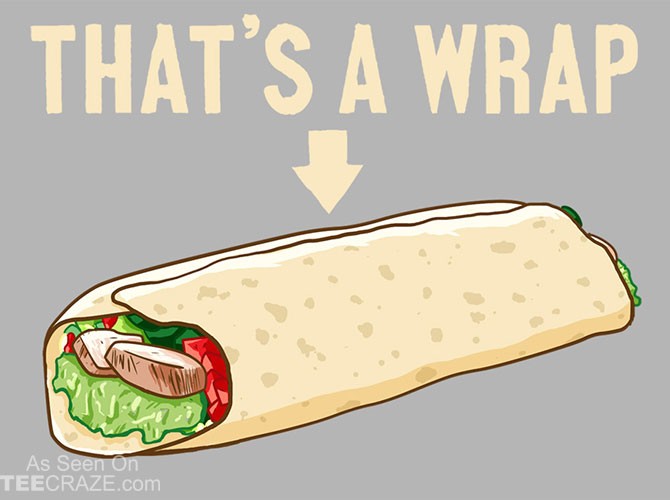And That s a Wrap!
Post on: 18 Июль, 2015 No Comment

If youre looking to delegate all the responsibility for your portfolio to someone else, a wrap account might be the answer. And thats a wrap!
Mutual funds are the most popular form of professionally managed money in the financial market today. However, some other types of managed money have become increasingly popular in the last year. There has been an increasing focus in the financial press on wrap accounts and investment portfolios beyond mutual funds.
What exactly are wraps, and what alternatives do investors have beyond mutual funds?
A wrap account is a form of managed money that combines or wraps commissions and management costs into one fee based on the value of the assets within the plan. Unlike mutual funds, this fee is paid out of the assets as a separate expense and is therefore tax-deductible to the investor. While these managed accounts sound very similar to mutual funds, they offer greater customization and may require higher minimum investment levels.
As with mutual funds, the wrap industry can be very confusing, because the terminology is being overused and abused. To help you understand wraps, I offer descriptions of three different types of wrap account:
Mutual fund wrap:
Companies such as Mackenzie, MRS Keystone, Royal Bank and Scotia Bank have programs in which they select portfolios of mutual funds wrapped together into a customized portfolio. These programs are easily accessible with relatively low minimums (for example, $2,500) but they can be expensive, as they tend to tack on an extra fee to the existing MER of the mutual funds. These programs justify their additional fees through extra services like re-balancing, monitoring, reporting, etc.
Pooled wraps:
Other programs such as AGF Harmony and RBC Sovereign offer unique pools of investments instead of mutual funds. To all intents and purposes, a pool is a no different than a mutual fund, except that mutual funds can be bought and sold by pretty much anyone, while these pools are more exclusive. The pools are often managed by investment counsellors or well-known portfolio managers. Pooled wraps will also promote the benefits of re-balancing, research, consulting, monitoring managers, reporting and other custodial services.
While many financial institutions and advisers are promoting the benefits of these wrap accounts, independent experts express some concerns. Dan Hallet of Sterling Mutual Funds points out: My research has shown that wraps cost more than the average load fund portfolio. Also, pools and wraps often dont offer any exposure to more specific markets or sectors. Retail funds seem to have the best offering of these more specialized products.
It is also worth noting that a wrap account may have a dozen or so investment choices or pools, which can also be limiting. Retail funds provide much more choice and opportunity.
Private managed accounts (PMA):
These investments are really the pinnacle of investing. The minimums are usually extremely high ($500,000) but the biggest advantage is the low management fees, which are often half of those for a retail mutual fund, or many pooled wrap accounts. Often PMAs bypass the adviser or broker; the investor deals directly with the investment manager. These plans are truly customized, but you are usually dealing with only a few money managers. As a result, you can lose the diversity of different management styles and disciplines that can be found in mutual funds.
Some PMA accounts also allow the transfer of non-registered (open) stock brokerage accounts without incurring a tax liability. Thus, if you wanted to move a stock brokerage account into managed money and away from individual stock selection, this might be a viable solution.
Will the average PMA account outperform the average mutual fund portfolio? No. A lower MER does not guarantee better performance. But given two similar investment portfolios, it would be rational to choose the portfolio with the lower MER.
One of the best analogies describing wrap accounts comes from an article I read recently by Clay Gillespie of the Rogers Group in Vancouver: If buying a suit is like buying managed money, then buying a suit off the rack and having it altered is like buying a mutual fund. Having a suit specially made is like purchasing a private managed account. A wrap account, on the other hand is like purchasing a suit off the rack, having it altered, and buying all the accessories.
Not all wraps are created equal
Basically, all wrap accounts will allocate your assets based on your personal goals and objectives and your risk tolerance, as determined by an investment policy statement designed specifically for you. A typical wrap account will allocate your funds among a series of pools of money, or mutual funds.
However, wrap accounts can differ dramatically from institution to institution. I offer a checklist you should go through if you are given the latest pitch. This list is similar to questions you should ask if investing in mutual funds.
What are the fees?
Wrap account fees can range from as low as 1.5 per cent to as high as 3.5 per cent. Once you start getting into fees higher than 2.25 per cent, you should determine if these investments would actually be better than retail mutual funds.
How many investments, or pools, are there to choose from?
Again, this aspect of wrap accounts can often be very limited. Dont get lured by the exclusivity. many of the managers of these pools are managers you can find through the mutual fund products. For example, if there is one Global Equity pool in the wrap and it for whatever reason does not perform to your expectation, what alternatives do you have as the investor?
Who are the managers and what is their track record?
Just as this is important for mutual funds, it is equally important for wrap accounts. It is important to know some information about the disciplines and policies, and how they have performed in the past.

What are the tax benefits?
If someone tells you that you are getting tremendous advantage over retail funds because the fees are deductible, be careful. Many experts have shown that there is not that much difference, once you take into account all of the issues surrounding taxes.
What are the minimums?
Generally, the more money you have to invest, the more likely you are to be able to negotiate fees. Just because wrap programs have higher minimums does not make them any better than mutual funds or other wrap programs.
What are the advantages of wrap accounts?
Often these programs will promote benefits such as personalized portfolio allocations, monitoring of managers, custom reporting functions and other custodial services. However, understand that these benefits can be attained without the use of wraps.
Professionally managed money is an area that will continue to offer new products and new features. The first type of professional money management was the mutual fund. The second was wrap accounts, followed by a PMA type of account. I suggest that all three should be reviewed to decide which is best suited to your particular needs and situation.
My two cents (for what it is worth)
Wrap accounts are very complicated for the average investor. They are designed for investors who are looking to delegate to someone else all of the legwork and responsibility of customizing, designing and managing a portfolio.
This is going to be controversial, but in researching this topic extensively, I see no compelling reason why investors would look at most of the wrap accounts out there. They are being promoted aggressively out of self-interest by financial institutions, brokers and planners. The fee issue is not relevant in most cases, because most wrap accounts have fees equivalent to those of the average mutual fund.
Finally, I think the marketing of wrap accounts parallels the marketing of segregated funds more hype than substance. After you do the homework, analytic investors realize that these products are simply backed by a lot of hype. Perception is reality and the pitch for wraps revolves around ease of management because someone else does all the work. The thought that wrap accounts are the next best thing beyond mutual funds baffles me and I have not heard a compelling argument to date!
Make sure you do your homework before you give someone all that responsibility.
There are exceptions to every rule. Dan Hallet points out there are some wrap accounts worth considering, but they are not the ones that are typically promoted through the advice channels.
In the end, managed money comes in different forms mutual funds, wrap account and private managed accounts. Do the research and you will know what is best for you.














